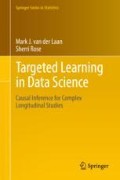Abstract
Breastfeeding is considered best practice in early infant feeding, and is recommended by most major health organizations. However, due to the impossibility of directly allocating breastfeeding as a randomized intervention, no direct experimental evidence is available. The PROmotion of Breastfeeding Intervention Trial (PROBIT) was a cluster-randomized trial that sought to evaluate the effect of a hospital program that encouraged and supported breastfeeding, thereby producing indirect evidence of its protective effect on infant infections and hospitalizations.
Access this chapter
Tax calculation will be finalised at checkout
Purchases are for personal use only
References
H. Bang, J.M. Robins, Doubly robust estimation in missing data and causal inference models. Biometrics 61, 962–972 (2005)
A.C. Cameron, J.B. Gelbach, D.L. Miller, Boostrap-based improvements for inference with clustered errors. Rev. Econ. Stat. 90(3), 414–427 (2008)
M. Finster, M. Wood, The Apgar score has survived the test of time. Anesthesiology 102(4), 855–857 (2005)
S. Gruber, M.J. van der Laan, A targeted maximum likelihood estimator of a causal effect on a bounded continuous outcome. Int. J. Biostat. 6(1), Article 26 (2010b)
T. Hastie, gam: generalized additive models (2011) http://CRAN.R-project.org/package=gam
M.G. Hudgens, M.E. Halloran, Toward causal inference with interference. J. Am. Stat. Assoc. 103(482), 832–842 (2008)
M.S. Kramer, B. Chalmers, E.D. Hodnett, Z. Sevkovskaya, I. Dzikovich, S. Shapiro, J.P. Collet, I. Vanilovich, I. Mezen, T. Ducruet, G. Shishko, V. Zubovich, D. Mknuik, E. Gluchanina, V. Dombrovskiy, A. Ustinovitch, T. Kot, N. Bogdanovich, L. Ovchinikova, E. Helsing, PROmotion of breastfeeding intervention trial (PROBIT). J. Am. Med. Assoc. 285(4), 413–420 (2001)
M.S. Kramer, T. Guo, R.W. Platt, S. Shapiro, J.P. Collet, B. Chalmers, E. Hodnett, Z. Sevkovskaya, I. Dzikovich, I. Vanilovich, Breastfeeding and infant growth: biology or bias? Pediatrics 110(2), 343–347 (2002)
S. Milborrow, T Hastie, R Tibshirani, Earth: multivariate adaptive regression spline models. R package version 3.2-7 (2014)
A. Peters, T. Hothorn, ipred: improved predictors (2009) http://CRAN.R-project.org/package=ipred
E.C. Polley, M.J. van der Laan, SuperLearner: super learner prediction (2013). http://CRAN.R-project.org/package=SuperLearner
E.C Polley, S. Rose, M.J. van der Laan, Super-learning, in Targeted Learning: Causal Inference for Observational and Experimental Data, ed. by M.J. van der Laan, S. Rose (Springer, Berlin, Heidelberg, New York, 2011)
K.E Porter, S. Gruber, M.J. van der Laan, J.S. Sekhon, The relative performance of targeted maximum likelihood estimators. Int. J. Biostat. 7(1) (2011)
R Development Core Team. R: A language and environment for statistical computing. R Foundation for Statistical Computing, Vienna (2016). http://www.R-project.org.
J.M. Robins, A new approach to causal inference in mortality studies with sustained exposure periods–application to control of the healthy worker survivor effect. Math. Modell. 7, 1393–1512 (1986)
J.M. Robins, Robust estimation in sequentially ignorable missing data and causal inference models, in Proceedings of the American Statistical Association (2000)
D.B. Rubin, Randomization analysis of experimental data: The fisher randomization test comment. J. Am. Stat. Assoc. 75(371), 591–593 (1980)
M.E. Schnitzer, M.J. van der Laan, E.E.M. Moodie, R.W. Platt, Effect of breastfeeding on gastrointestinal infection in infants: a targeted maximum likelihood approach for clustered longitudinal data. Ann. Appl. Stat. 8(2), 703–725 (2014)
M.J. van der Laan, S. Gruber, Targeted minimum loss based estimation of causal effects of multiple time point interventions. Int. J. Biostat. 8(1), Article 9 (2012)
M.J. van der Laan, E.C. Polley, A.E. Hubbard, Super learner. Stat. Appl. Genet. Mol. 6(1), Article 25 (2007)
T.J. VanderWeele, M.A. Hernán, Causal inference under multiple versions of treatment. J. Causal Inference 1(1), 1–20 (2013)
W.N. Venables, B.D. Ripley, Modern Applied Statistics with S, 4th edn. (Springer, Berlin, Heidelberg, New York, 2002)
Author information
Authors and Affiliations
Corresponding author
Rights and permissions
Copyright information
© 2018 Springer International Publishing AG
About this chapter
Cite this chapter
Schnitzer, M.E., van der Laan, M.J., Moodie, E.E.M., Platt, R.W. (2018). LTMLE with Clustering. In: Targeted Learning in Data Science. Springer Series in Statistics. Springer, Cham. https://doi.org/10.1007/978-3-319-65304-4_15
Download citation
DOI: https://doi.org/10.1007/978-3-319-65304-4_15
Published:
Publisher Name: Springer, Cham
Print ISBN: 978-3-319-65303-7
Online ISBN: 978-3-319-65304-4
eBook Packages: Mathematics and StatisticsMathematics and Statistics (R0)

